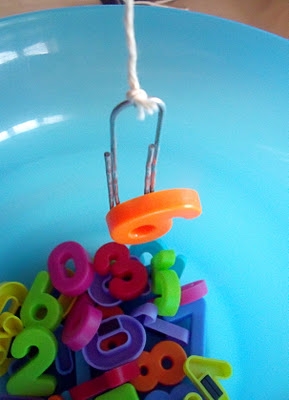 |
| Photo Source |
Tie string to paper clip and use as fishing rod for magnetic numbers.
Use for:
Number recognition
Comparing numbers: greater/less than
Adding, Subtracting, Dividing, Multiplying
 |
| Photo Source |
 |
| Photo Source |
 |
| Photo Source I have to admit that I have been guilty of telling a few too many white lies to my kids.This was recently made very apparent to me while struggling to convince my 2 year old to go down for a nap, my older daughter whispered in my ear, "tell her that I'm going to take a nap too". AAAAHHH!! My 4 year old was now giving me tips on how to lie! I took a major pause. My daughter knows that I lie and is following in my foot steps. Not OK. As parents we tell many lies: - "if you don't come with me right now, I'm leaving you here." -"you were the best dancer in the whole show" -"if you watch too much TV, your brain will turn to mush" Unfortunately, our hypocrisy will come back to bite us. How long can we lecture our children on the importance of telling the truth if we are fibbers ourselves? Children do not respond well to the "do as I say, not as I do approach", nobody does. We lie at different times and for different reason. Some are justifiable due to child's age/maturation. But, I do not want to risk losing my child's trust over my silly lies. Usually there is a valuable lesson in giving them the real reason why they must come right now, work hard to be a great dancer, and not watch so much TV. |
 |
| Photo Source |